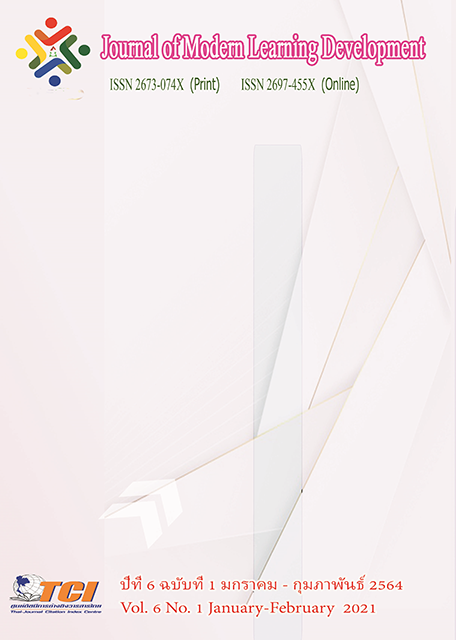The Development of Transformational Leadership of School Administrators According to Four Brahmavihara Dhammas under Khon Kaen Primary Educational Service Area Office 1
Main Article Content
Abstract
The objectives of this research paper were: 1) to study the development of the transformational leadership of the school administrators according to the Four Brahmavihara Dhammas (brahmavihāra-dhamma; sublime states of the mind) under KhonKaen Primary Educational Service Area Office 1; 2) to present the ways to develop the transformational leadership of the mentioned school administrators. This study was carried out by means of the mixed methodology research. Its population included 303 administrators and teachers in the schools under KhonKaen Primary Educational Service Area Office 1 and the samples were calculated based on the method of Krejcie and Morgan and the target group included 5 school administrators and 5 teachers (total 10), selected by a purposive sampling method. The quantitative data were used to synthesize the qualitative data to acquire the ways to develop the transformational leadership of the mentioned school administrators.
The research results were as follows:
1. The development of transformational leadership of school administrators according to Brahma Vihara 4 was found that the overall practice was at a high level with the mean () = 4.31. The most action being was the leadership of change according to the equation with the mean () = 4.34
2. The ways to develop the transformational leadership of the mentioned school administrators are as follows:1) School administrators should have good human relations, generosity and compassion for personnel in the work segment. They should wish everyone to have unity, be reasonable and be a good friend with colleagues. 2) School administrators should provide appropriate assistance to personnel in the organization. They should have sacrifice, work with consistency and role model. 3) School administrators should create work incentives for personnel, place themselves appropriately, and be a good role model in their conduct, praise people when they are successful in their careers, show sincere congratulations and announce their honor to other people as an example. 4) School administrators should place themselves on the basis of justice when problems arise and work according to morality, ethics, neutrality and flexible work.
Article Details
References
การพัฒนาคุณธรรม จริยธรรม. (2563). ออนไลน์. สืบค้นเมื่อ 2 มิถุนายน 2563. แหล่งที่มา: http://www. dsdw2016.dsdw.go.th/doc_pr/ndc_25602561/PDF/8338s/5.203.pdf
ทักษะการเป็นผู้นำ และผู้ตามที่ดี.(2563). ออนไลน์. สืบค้นเมื่อ 2 มิถุนายน 2563. แหล่งที่มา: https://sites. google.com/site/karphathnathaksachiwit/bth-thi--thaksa-thang-sangkhm/2-1-thaksa-kar-pen-phuna-laea-phu-tam-thi-di
ผู้บริหารสถานศึกษายุคใหม่ในศตวรรษที่ 21. (2563). ออนไลน์. สืบค้นเมื่อ 2 มิถุนายน 2563. แหล่งที่มา: http://conference.edu.ksu.ac.th/file/20160809_2488101126.pdf
พระปลัดวัฒนชัย อภิวณฺโณ (ท้วมสม). (2558). การศึกษาภาวะผู้นำของผู้บริหารโรงเรียนเตรียมอุดมศึกษาพัฒนาการ ตามหลักพรหมวิหาร 4 เขตสวนหลวง กรุงเทพมหานคร. ปริญญาพุทธศาสตรมหาบัณฑ. บัณฑิตวิทยาลัย: มหาวิทยาลัยมหาจุฬาลงกรณราชวิทยาลัย.
พระราชบัญญัติการศึกษาแห่งชาติ. (2553). ออนไลน์. สืบค้นเมื่อ 2 มิถุนายน 2563. แหล่งที่มา: https://person.mwit.ac.th/01-Statutes/NationalEducation.pdf
สำนักงานสภาพัฒนาการเศรษฐกิจและสังคมแห่งชาติ. แผนพัฒนาเศรษฐกิจและสังคมแห่งชาติ ฉบับที่ 12 (พ.ศ. 2560 - 2564). ออนไลน์. สืบค้นเมื่อ 2 มิถุนายน 2563. แหล่งที่มา: https://www. nesdc.go.th/ewt_dl_link.php?nid=6422
สุบรรลุ เหตุผล. (2561). ภาวะผู้นำตามหลักพรหมวิหาร 4 ของผู้บริหารสถานศึกษาโรงเรียนพระปริยัติธรรมแผนกสามัญศึกษา สังกัดสำนักงานพระพุทธศาสนา จังหวัดมหาสารคาม. ปริญญาพุทธศาสตรมหาบัณฑิต. บัณฑิตวิทยาลัย: มหาวิทยาลัยมหาจุฬาลงกรณราชวิทยาลัย.


